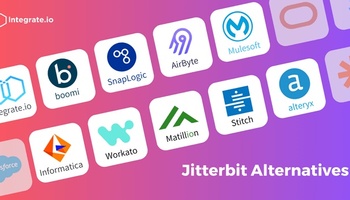APIs are powerful for ETL (extract, transform, load) and data integration workflows. API integrations make it possible for the seamless exchange of information between websites, databases, and applications.
The Integrate.io API allows you and your enterprise to monitor Integrate.io clusters and jobs. Through the Integrate.io data processing package and Integrate.io web application, you can call the Integrate.io API to:
- Create Clusters
- Run Jobs
- Monitor Progress on Clusters and Jobs
- Terminate any Jobs or Clusters
Read on to discover more about APIs, the benefits associated with API integration, and how Integrate.io can help.
Table of Contents
- What Is API Integration?
- The Benefits of API Integration
- How Integrate.io Can Help
What Is API Integration?
The acronym API stands for Application Programming Interface. APIs allow applications to talk to each other. Essentially, APIs act as a transportation method for web tools and software applications. They ship all the interactions sent and received between two or more applications in a reliable, efficient, and safe manner.
API integration is simply the connection between two or more applications, via their individual APIs, that let the systems exchange data. API integrations are used in many scenarios to keep data in sync. Read on to discover some common examples of API integrations and how APIs can help your business with automating systems, enhancing data sharing, and integrating applications.
Related Reading: Integrate.io's REST API Connector
Examples of API Integrations:
- Financial Institutions: Banks use private APIs to send and receive data that relates to checking accounts, credit cards, transactions, payments, and more.
- Travel Booking: One business sector that functions through API integrations is travel booking sites. These sites use APIs to collect flight and hotel availabilities from third-party providers. The information is sent back and forth between the travel booking site and third-party providers, allowing customers to easily find the best deals and book with multiple hotels or airlines all within the same application.
- Online Weather Reports: When you Google search your local weather or check the forecast on one of your phone apps, this information is being fed to these platforms through an API. These tech platforms aren’t in the weather business, so they receive weather data from a third party and send and receive updates through an API.
- Social Media Bots: APIs can be used on social media platforms to automatically follow or message an account based on specified software instructions.
- Streaming Services: Large streaming services like Netflix and Spotify use APIs to distribute their content to consumers.
- Auto Industry: Big auto companies like Tesla use APIs to send software updates to their vehicles. APIs can also unlock car data.
The most common API integrations are REST APIs. Major companies like Google, Twitter, Amazon, and LinkedIn are all known to use REST APIs. According to one study, 83 percent of APIs now use the REST architecture.
With the advanced features of Integrate.io's REST API connector you can complete the following:
- Complete Authorizations
- GET and POST Requests
- Response Parsing
- Pagination Schemes
- Rate Limiting
- JSON Path Expression for the Base Response
- Specifying the Schema Interactively
Related Reading: How to Make a REST API
The Benefits of API Integration With Integrate.io
Along with sending, interpreting, and receiving data, API integrations can provide a number of benefits to the businesses and corporations that use them. Some of the major benefits of API integration are listed below:
- Automation: API integration helps to eliminate the need for manual insertion of data and information, dramatically reducing errors and saving time.
- Scalability: API integrations make scaling much more accessible as it removes the need to start from scratch when creating connected web systems and software applications.
- Communication: API integrations create a streamlined approach, making data tracking and overall communication more effective.
- Reduced Errors: One of the most significant benefits of API integration is that it allows for the fast, efficient, and safe transfer of complex data with reduced errors during transfer.
Related Reading: How to Build a REST API: Types and Requirements
How Integrate.io Can Help You With API Integration
Integrate.io can help with all of your API integration needs. The powerful Integrate.io API provides functions for controlling and monitoring Integrate.io clusters and jobs. When working with the Integrate.io platform, you can use the Integrate.io API to create clusters, run jobs, monitor the progress of these jobs, and terminate any jobs or clusters that are running.
Are you ready to get started using Integrate.io APIs for your enterprise data needs? Contact our team today to schedule a 14-day demo or pilot and see how we can help you reach your goals










